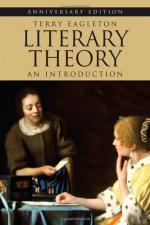
|
| Name: _________________________ | Period: ___________________ |
This test consists of 5 multiple choice questions, 5 short answer questions, and 10 short essay questions.
Multiple Choice Questions
1. What three sequential stages does Eagleton point out in the development of modern literary theory?
(a) The preoccupation with the critic, the exclusive concern with the author, and a shift toward the text.
(b) The preoccupation with the author, the exclusive concern with the text, and a shift toward the reader.
(c) The preoccupation with the text, the exclusive concern with the reader, and a shift toward the author.
(d) The preoccupation with the reader, the exclusive concern with the text, and a shift toward the critic.
2. According to Eagleton, when did the Russian formalists emerge?
(a) Before the Bolshevik Revolution.
(b) After WWI.
(c) Before WWII.
(d) During the Russian Revolution.
3. According to the Russian formalist Osip Brik, Pushkin's "Eugene Onegin" would have been written if Pushkin had what?
(a) Not lived.
(b) Married early.
(c) Been uneducated.
(d) Died young.
4. According to Eagleton, literature is definable "not according to whether it is fictional or "imaginative," because it uses language in ____ways."
(a) Pendantic.
(b) Profound.
(c) Peculiar.
(d) Pragmatic.
5. How far has the "theoretical revolution" spread according to Eagleton?
(a) Within the inner circle of critics and readers.
(b) To the outer circle of critics and readers.
(c) Far beyond the circle of specialists and enthusiasts.
(d) Not beyond the circle of specialists and enthusiasts.
Short Answer Questions
1. What "twin impacts" does Eagleton cite in the mid-Victorian period that was particularly worrisome to the ruling class?
2. Who developed hermeneutics?
3. For E.D. Hirsch, the aim of "policing" an author's meaning is to what, according to Eagleton?
4. For Eagleton, how did the romantics usher a "forestalling of reasoned critical enquiry"?
5. According to Eagleton, "in the terminology of reception theory, the reader _________ the literary work, which is in itself no more than a chain of organized black marks on a page."
Short Essay Questions
1. What were the Russian formalists responding to in terms of literary criticism?
2. Why does Eagleton call the emergence and development of literary theory a "theoretical revolution" and what does it signify?
3. What is Eagleton's goal in writing "Literary Theory: An Introduction"?
4. What is the significance of Viktor Shklovsky's 1917 essay "Art as Device," according to Eagleton?
5. How did the Russian formalists answer the question "what is literature?" and why was it significant?
6. Why does Eagleton argue that the demarcation between fiction and fact in writing is "questionable"?
7. What period of literature did the critic Roland Barthes focus on and why is it significant?
8. What was the dominant ideology of eighteenth-century England?
9. How does Eagleton respond to critics who claim that literary theory as irrelevant or elitist and what are its implications?
10. What is Eagleton's major problem with formalism and why is it significant?
|
This section contains 857 words (approx. 3 pages at 300 words per page) |

|




